
In baseball or softball, a pinch runner is a player substituted into a game for the purpose of base running.

In baseball or softball, a pinch runner is a player substituted into a game for the purpose of base running.
A pinch runner may be faster or otherwise more skilled at base running than the player for whom the pinch runner has been substituted. Occasionally, a pinch runner is inserted for other reasons (such as a double switch, ejection, or if the original player on base has become injured). For statistical and scorekeeping purposes, the pinch runner is denoted by PR. [1]
As with all substitutions at most levels of baseball, when a player is pinch run for, that player is removed from the game. Some leagues, especially for youths, may allow substituted players to re-enter a game. After serving as a pinch runner, a player may remain in the game and assume a defensive position, or may be substituted for at the manager's discretion.
In the early history of professional baseball, the National League, which began play in 1876, changed a rule in 1878 such that pinch runners were not allowed except in cases of illness or injury, with the substitute entering the game after the original player reached base. [2] Later rule changes[ when? ] allowed for pinch runners at a manager's discretion.
A pinch runner is not credited with a game played for the purpose of consecutive-game playing streaks, per the Official Rules used by Major League Baseball (MLB). [3] For example, in May 1984, Alfredo Griffin of the Toronto Blue Jays scored the winning run in a game, yet his consecutive game streak ended as he appeared only as a pinch runner. [4]
One of the most famous pinch runners in major-league history was Herb Washington of the Oakland Athletics. [5] Oakland owner Charlie Finley, known as an unconventional thinker, came to believe that it would be useful to have a "designated runner"—a fast player on the roster whose only job was to periodically enter a game and run the bases for slower players. He signed Washington, a track star with no baseball experience. Washington appeared in 105 games for the Athletics in 1974 and 1975, scoring 33 runs and stealing 31 bases, without once playing the field or coming up to bat. [6] His 1975 Topps baseball card is the only baseball card known to use a "Pinch Runner" position label. [7]
Outfielder Dave Roberts made a notable appearance as a pinch runner in the bottom the ninth inning of Game 4 of the 2004 American League Championship Series, stealing a base and going on to score the tying run in a game the Boston Red Sox went on to win in 12 innings, leading to a series victory over the New York Yankees. [8]
As of 2023, MLB was considering allowing teams to have a "designated runner". The Atlantic League of Professional Baseball, an official MLB Partner League, tested rules for a designated runner in 2023. As described by BallparkDigest.com, the rules for a designated runner were: [9]
Each club will list a player who is not otherwise in the starting lineup as a designated pinch runner. That player may then be substituted at any point into the game as a baserunner. The player who is substituted for, as well as the pinch runner, may then return to the game without penalty.
Between 1877 and 1949, major-league teams occasionally used "courtesy runners" in addition to pinch runners. [10] A baserunner that had to leave the game temporarily, due to injury or an equipment issue, could be replaced by a courtesy runner. The courtesy runner could be a player who had not yet appeared in the game (in which case, the courtesy runner could still be used later as a substitute) or could be a player already in the game (in which case, that player's position in the batting order was not affected). The player who had to leave was free to rejoin the game when his team returned to the field defensively, although in some cases, an injury proved to be serious enough that he was replaced by a substitute. The last use of a courtesy runner in the major leagues was in 1949. [10]
An example of a courtesy runner occurred in a game between the Detroit Tigers and St. Louis Browns during the 1944 season, on August 31. [11] In the second inning, Detroit right fielder Jimmy Outlaw was hit in the head by a pitch, leaving him temporarily unconscious. [12] With permission of the St. Louis manager, [12] Detroit first baseman Rudy York, who had made the first out of the inning, ran for Outlaw. [11] After Detroit finished batting that half-inning, both Outlaw (who had "recovered shortly") [12] and York returned to their defensive positions and played the rest of the game. [11]
The Official Rules used by MLB now forbid courtesy runners. [13]
During major-league history, there have been a few instances of "mid-play runners". [10] This is a rare situation where the Official Rules allow an injured baserunner to be substituted, [14] and play then resumes. [10] Two known instances—occurring in 1977 and 2005—occurred when a baserunner entitled to score was injured such that he had to be removed from the game, and a substitute was allowed to enter the game to finish the base running and score the run. [10] A similar instance, which occurred in 2008 but did not involve injury, occurred due to a replay review that turned an apparent single, following which the batter was replaced by a pinch runner, into a home run—the pinch runner then ran out the home run to score the run. [10]
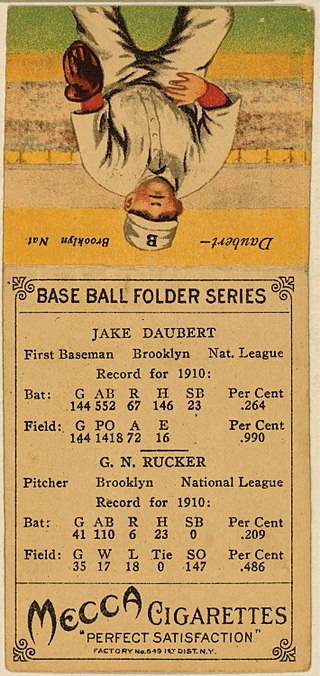
Baseball statistics include a variety of metrics used to evaluate player and team performance in the sport of baseball.
In baseball, an earned run is any run that was fully enabled by the offensive team's production in the face of competent play from the defensive team. Conversely, an unearned run is a run that would not have been scored without the aid of an error or a passed ball committed by the defense; it is "unearned" in that it was, in a sense, "given away" by the defensive team.

Extra innings is the extension of a baseball or softball game in order to break a tie.
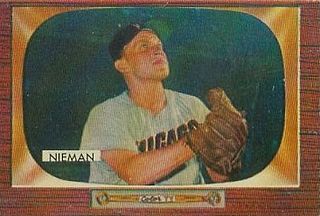
Robert Charles Nieman was an American professional baseball player and scout. An outfielder, he spent all or parts of a dozen Major League Baseball seasons with the St. Louis Browns (1951–52), Detroit Tigers (1953–54), Chicago White Sox (1955–56), Baltimore Orioles (1956–59), St. Louis Cardinals (1960–61), Cleveland Indians (1961–62) and San Francisco Giants (1962). He also played one season in Japan for the Chunichi Dragons (1963). He threw and batted right-handed, stood 5 feet 11 inches (1.80 m) tall and weighed 195 pounds (88 kg).
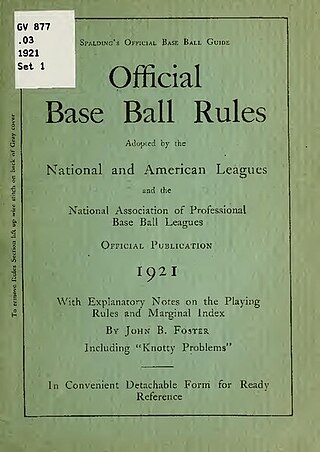
Throughout baseball's history, the rules have frequently changed as the game continues to evolve. A few typical rules most professional leagues have in common are that four balls are a base on balls, three strikes are a strikeout, and three outs end a half-inning.

In baseball, a pinch hitter (PH) is a substitute batter. Batters can be substituted at any time while the ball is dead ; the manager may use any player who has not yet entered the game as a substitute. Unlike basketball, American football or ice hockey, and in a similar way to association football, baseball does not have a free substitution rule and thus the replaced player is not allowed back into that game. The pinch hitter assumes the spot in the batting order of the player whom he replaces. Pinch hitters are commonly used to replace a weak hitter or to gain a platoon advantage.

The 1974 World Series was the championship series of Major League Baseball's (MLB) 1974 season. The 71st edition of the World Series, it was a best-of-seven playoff played between the American League (AL) champion Oakland Athletics and the National League (NL) champion Los Angeles Dodgers. The Athletics won the series, four games to one; after splitting the first two in Los Angeles, Oakland swept their three home games to close it out.

The 1907 World Series was the championship series in Major League Baseball for the 1907 season. The fourth edition of the World Series, it featured the defending National League champion Chicago Cubs and the American League champion Detroit Tigers. The Cubs won the Series four games to none for their first championship.

William Havon Bruton was a Major League Baseball (MLB) center fielder who played for the Milwaukee Braves (1953–1960) and Detroit Tigers (1961–1964). Bruton batted left-handed and threw right-handed.

Baseball scorekeeping is the practice of recording the details of a baseball game as it unfolds. Professional baseball leagues hire official scorers to keep an official record of each game, but many fans keep score as well for their own enjoyment. Scorekeeping is usually done on a printed scorecard and, while official scorers must adhere precisely to one of the few different scorekeeping notations, most fans exercise some amount of creativity and adopt their own symbols and styles.

Benjamin Ambrosio Oglivie Palmer is a Panamanian former professional baseball left fielder, who played in Major League Baseball (MLB) for the Boston Red Sox (1971–1973), Detroit Tigers (1974–1977), and Milwaukee Brewers (1978–1986). He also played two seasons in Nippon Professional Baseball (NPB) for the Kintetsu Buffaloes (1987–1988). Oglivie batted and threw left-handed.
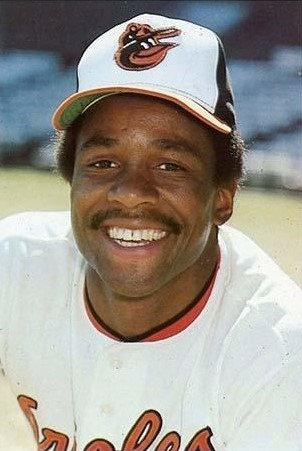
Alonza Benjamin Bumbry is an American former Major League Baseball (MLB) outfielder who played for the Baltimore Orioles and San Diego Padres from 1972 through 1985. Bumbry was the 1973 American League Rookie of the Year, and went on to be an All-Star and World Series champion. He is an inductee of the Baltimore Orioles Hall of Fame and the Virginia Sports Hall of Fame. Prior to his major league career, Bumbry served in the US Army during the Vietnam War and was awarded a Bronze Star.
The Grand Slam Single was a baseball play that ended Game 5 of the 1999 National League Championship Series, contested between the rival New York Mets and Atlanta Braves, on October 17, 1999, at Shea Stadium in New York City. Mets player Robin Ventura recorded a game-winning hit, and although it cleared the outfield fences and normally would have been ruled a grand slam, he never completed his trip around the bases due to the on-field celebration; thus, it was only credited as a single.
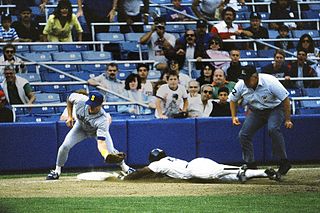
In the sport of baseball, small ball is an informal term for an offensive strategy in which the batting team emphasizes placing runners on base and then advancing them into scoring position for a run in a deliberate, methodical way. This strategy places a high value on individual runs and attempts to score them without requiring extra base hits, or sometimes without base hits at all, instead using bases on balls, stolen bases, sacrifice bunt or sacrifice fly balls, the hit-and-run play, and aggressive baserunning with such plays as the contact play. A commonly used term for a run produced playing small ball is a "manufactured run". This style of play was more often found in National League game situations than in the American League due in large part to the absence of the designated hitter in the National League until the universal adoption of the Designated Hitter.

Harold Morris "Gomer" Hodge was an American professional baseball player, coach and manager. He appeared in 80 Major League Baseball games primarily as a pinch hitter for the Cleveland Indians in 1971. Born in Rutherfordton, North Carolina, Hodge was signed by the Indians in 1963, and spent the next eight seasons in the minor leagues. He joined the Indians in 1971, hitting four times in his first four at bats and becoming a fan favorite of the team. After a full season with the Indians, he was demoted back to the minor leagues, served as a player-coach for one season and, after retiring as a ballplayer, became a coach in the Indians organization. He then served as a manager and coach for teams in the Milwaukee Brewers, Montreal Expos, and Boston Red Sox organizations until his death in 2007.
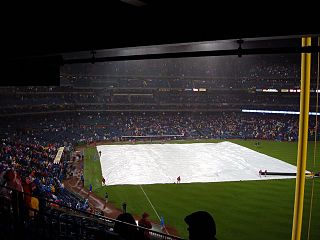
A suspended game in baseball occurs when a game has to be stopped before it can be completed, and the game is meant to be finished at a later time or date. Suspended games are used in Major League Baseball, Minor League Baseball, and may also be used at other levels of play depending on league or tournament rules.
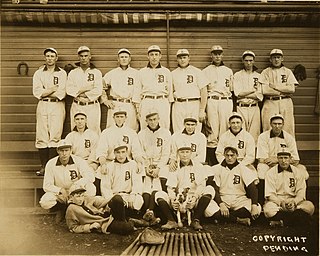
The 1907 Detroit Tigers won the American League pennant with a record of 92–58, but lost to the Chicago Cubs in the 1907 World Series, four games to none. The season was their seventh since they entered the American League in 1901.

Jarrod Martel Dyson is an American former professional baseball center fielder. He has played in Major League Baseball (MLB) for the Kansas City Royals, Seattle Mariners, Arizona Diamondbacks, Pittsburgh Pirates, Chicago White Sox and Toronto Blue Jays.

Herman Alexander Hill was an American professional baseball player, an outfielder who appeared in 43 Major League games for the 1969–1970 Minnesota Twins. Hill drowned while swimming in the Caribbean Sea off the coast of Venezuela during the 1970 winter baseball season.

Jose Alexander Siri is a Dominican professional baseball center fielder for the New York Mets of Major League Baseball (MLB). He has previously played in MLB for the Houston Astros and Tampa Bay Rays. He made his MLB debut in 2021 with the Astros.
A pinch-running appearance only shall not extend the streak.
Comment: This rule is intended to eliminate the practice of so-called courtesy runners.
If an accident to a runner is such as to prevent him from proceeding to a base to which he is entitled, as on a home run hit out of the playing field, or an award of one or more bases, a substitute runner shall be permitted to complete the play.